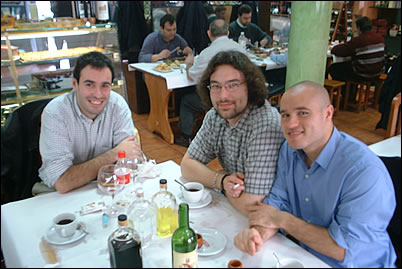La política española parece un circo de tres pistas. No sólo se intercambian insultos y descalificaciones indignas, sino que encima unos mienten descaradamente a los ciudadanos mientras los otros ejercitan la demagogia más rastrera para ganar votos. No puedo evitar contrastarlo con la situación en el Reino Unido. No sólo Blair parece sinceramente convencido de la postura que mantiene, cosa que no puedo decir de los otros dos, sino que es capaz de defenderla con elocuencia, que es más de lo que puedo decir de los otros dos. ¿Y qué me dicen de Robin Cook? Su discurso ante el parlamento británico ha sido un ejemplo perfecto de oratoria política, una muestra de dignidad y elegancia, que puede citarse casi indefinidamente:
Our interests are best protected not by unilateral action but by multilateral agreement and a world order governed by rules.
O, cuando habla de los argumentos para atacar Irak.
Ironically, it is only because Iraq’s military forces are so weak that we can even contemplate its invasion. Some advocates of conflict claim that Saddam’s forces are so weak, so demoralised and so badly equipped that the war will be over in a few days.
We cannot base our military strategy on the assumption that Saddam is weak and at the same time justify pre-emptive action on the claim that he is a threat.
Iraq probably has no weapons of mass destruction in the commonly understood sense of the term – namely a credible device capable of being delivered against a strategic city target.
It probably still has biological toxins and battlefield chemical munitions, but it has had them since the 1980s when US companies sold Saddam anthrax agents and the then British Government approved chemical and munitions factories.
Why is it now so urgent that we should take military action to disarm a military capacity that has been there for 20 years, and which we helped to create?
Why is it necessary to resort to war this week, while Saddam’s ambition to complete his weapons programme is blocked by the presence of UN inspectors?
